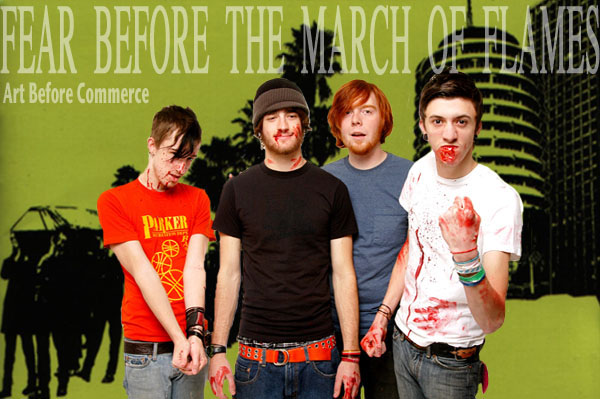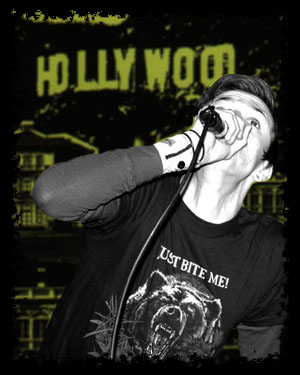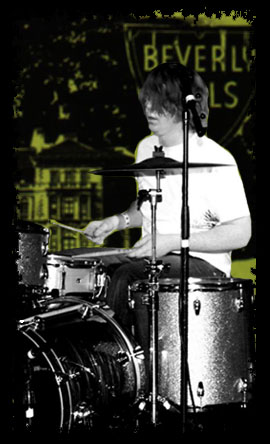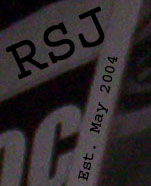|

Everyone is in it for the money. Everyone. If you've been listening to what the music industry's been turning out lately,
it's hard not to feel this way. But if you look hard enough, there actually are those out to prove that concept false. Enter
the eclectic Fear Before The March Of Flames, who've mixed a multitude of hardcore styles with a dose of 'who gives a damn
what the mainstream thinks' to come out with their most recent effort, Art Damage. Guitarist Adam Fisher speaks with Rock
Star Journalism about doing it for the music, not the majority.
Rock Star Journalism: When you first started the band, you guys were in high school. At that age, did you have a specific
idea of what sound you were setting out to do?
Adam Fisher: Nope. I had been in other bands before, all of which were totally different styles. I had been writing
songs for a long time, and they just kind of started sounding a certain way.
RSJ: Did you find a supportive scene in Colorado?
AF: Not always. There is a lot of people who will support you and act like they want the best for you, and as soon as
you see any amount of success they talk trash on you and come to your shows and yell insults, then turn and laugh with their
gang of apes. But that's the kind of bullshit you have to face sometimes, I guess. That's not to say there isn't a strong
supportive group of friends in our area -- there are kids in Denver who have probably been to every single one of our shows
here since day one. That means the world to us and those are the people we really care about, not the neanderthals who didn't
work hard enough to get their band off the ground.
RSJ: What do you think first got you noticed in the extremely overpopulated hardcore scene?
AF: Well, it wasn't flashy haircuts, brutal mosh parts, or t-shirts with guns and knives and hearts on them. So, I guess
I'd have to say it was our sincerity in our music. This is what we love and care about. We're doing what we want period,
and I think that shows. We don't compromise what we believe to get somewhere or to fit in with a certain clique.
RSJ: Do you ever plan to re-release your now out of print first EP?
AF: Nope. Those who have it and really like it will have something pretty rare and cool. Anyone who hasn't heard it
would probably be surprised at what it sounds like. It's definitely not us anymore. It's cool to know anyone who has it
was there from the beginning because I think we only printed somewhere around 600.
RSJ: How would you say your sound evolved from Odd How People Shake to Art Damage?
AF: It's a different album. I never want to be a band that puts out the same album twice. We just grew as writers, and
Art Damage was the result. A little noisier and a little less melodic I suppose...but I'd like to think better songs.
RSJ: How did you get hooked up with [Converge and Between The Buried And Me producer] Matt Ellard for this album?
AF: We'd heard other albums he'd done and liked what he was able to bring out in the bands, sonically. We could just
tell he knew exactly what he was doing. Once we actually started working with him we were really happy about everything working
out because he is an amazing person to work with.
RSJ: What was the biggest change in the recording process between your first album and your second?
AF: We did the first one very low budget in our friend from Portland's studio. He did an awesome job, and we were really
happy with the result. We learned from the first one. We spent much much more time on Art Damage just making sure the songs
were coming out the way we wanted them to be heard.
 RSJ: On Art Damage, you seem to have become harder and more eclectic, as opposed to taking the route of going more commercial.
What's the hardest thing about being a band pushing against the mainstream?
AF: That less people are gonna like it. Don't really care though. If we wanted to be more commercial we would have.
Tons of other bands do it -- we just don't really care. Music is supposed to be a pure expression of oneself, so if we
had guided it a certain way it would not have been very pure or expressive at all.
RSJ: You've spoken before about the problems in the music industry that you've seen. As a young band, were you surprised
by what you found going on in business end of the music industry?
AF: Not so much surprised as bummed out. You can be told a thousand horror stories and never let yourself believe them,
but the truth is shitty people are out there, shitty people are making music, and shitty people are buying and selling bands
for every wrong reason. You can let it ruin music for you, you can join them, or you can say fuck it and do your own thing.
We just do our own thing I guess. And it's not to say there aren't amazing people in the industry because there are. We
work with the best people in the whole world. We're lucky enough to have a label who not only supports us but believes in
us and is truly like family -- everyone we work with are friends. We wouldn't have it any other way.
RSJ: You've said that you turned down a major label offer. Do you think you'll ever have any interest in that in the
future or do you always plan to stay on an indie?
AF: At this point in time major labels are so busy searching for the next big thing in the hardcore/screamo/indie whatever
you want to call it scene that I would steer clear of them at any cost. Lots of bands say it, and when someone sticks a huge
sack of money in your face it's really hard to back your words. I guess I'd just like to think if we stick to honesty and
what we love we won't ever have to worry about dealing with that sort of thing. And if we did, I honestly don't think we'd
make the wrong choice.
RSJ: Ever think about starting your own record label? This seems to be one way a lot of current underground bands are
combating the problems with getting major label support.
AF: I would love to. I am so passionate about bands I like that there is nothing I'd love more than to be able to give
them the experience we are getting to have. But it is such a hard job that there is no way any of us would just jump into
it. It would take so much planning to make sure it was done right.

RSJ: You've spoken in the past about the transition the record industry is in. What do you think is the best way for a band
working outside the mainstream to get the word out about their music?
AF: Tour your asses off. Play hard. Play what feels right and most of all enjoy it. If you're out playing music just
waiting for it to get good, you're never gonna be happy. You have to enjoy what you have going on or it's all just a joke.
RSJ: You've toured with a lot of different bands. What's been your favorite act to tour with?
AF: I could never answer that question. We have made so many friends through this band it is unbelievable. We have never
not gotten along with one single band we've ever toured with. We've been very lucky to have made so many friends over the
last two years.
RSJ: You've made it to some major tours fairly quickly. Ever find yourself overwhelmed by this?
AF: All the time. It's crazy to go from being in love with a band to opening for them. One of [vocalist] David's favorite
bands in the whole world is Zao. He's loved them for such a long time, and in three weeks we're leaving to tour with them.
How cool is that? It's always crazy to open a tour and see a line of kids outside or to see someone wearing your shirt or
someone singing along. It's insane. And some of the tours we've done have just been insane. I don't think you could go
on tour with a band like Norma Jean or Darkest Hour and not be overwhelmed. It's awesome.
RSJ: How did performing at the Warped Tour go? From bands I've spoken to before, that seems to be a love it or hate it
experience.
AF: It was fun. It's cool to hang out and make friends with other bands. At the same time it's pretty weird. The crowd
is usually really young kids who don't get what we're doing at all. Lots of those kids will buy our cd cause it's different
than the other bands on the tour and still not get what were about. And that sucks, but at the same time we could be saving
this kid from all the shitty fake music that they might happen upon on the very same day. Warped Tour is a lot of work, and
if you're not on a bus it's kinda shitty sometimes. But it was definitely a cool experience.
 RSJ: On your site you mention a recent bad experience with a promoter in Cleveland. How often do you find those sorts of
problems doing small club tours?
AF: Not all that often, but when it does come up it sucks really bad. Your first reaction is to just say fuck it and
leave, but you really can't do that to the kids who are there to see you play. You can talk a lot of shit onstage, but that
doesn't usually make a difference. Usually you'll get shut off so no one gets to see you anyway. We got shut off after five
songs for voicing the slightest bit of disgust with the promoter. Lucky for us we had a show only minutes away the next week
and were able to apologize to anyone who had to deal with the shitty people at HARDCORE MARKETING in Cleveland. We sincerely
felt really bad to anyone who paid to see Darkest Hour, and seven hours after they got to the show and weren't allowed to
re-enter [the venue], Darkest Hour went on. We felt even worse for the kids who opened the show and had to pay money to play.
It shouldn't work like that. And if anyone were to ask me I'd say avoid those types of promoters at all costs.
RSJ: Most hardcore shows are more about performance than visual effects. But given your band's love of movies, have you
ever wanted to add any theatrical element to your live show?
AF: We've thought about it a lot. I'd love to someday have onstage performers while we're playing. Hopefully one day
we'll be able to do something like that. And I don't doubt that we will.
RSJ: Do you have any tour plans for 2005 as of yet?
AF: We are going out for a couple weeks with Zao in January, and in March we are working on a tour right now with Circle
Takes The Square. Other than that we're not too sure of exactly what we will be doing. But we will definitely be touring.
RSJ: When do you think you'll be getting back in the studio?
AF: Hopefully fall of this coming year, but we're not sure. If we have an album written by then that is the plan. But
if not, we're definitely not going to rush anything.
RSJ: Do you have any thoughts on where you see your sound going for the next record?
AF: Nope. Somewhere different than our past two I'd imagine.
RSJ: For bands working in the underground, success is often determined by a different set of standards. What needs to
happen in your career for you to feel successful?
AF: I already am.
RSJ: And finally, I read in your tour diary that you got the chance to check out GWAR recently. Was that experience all
that one might think it would be?
AF: And sooooo much more. Lots of blood.


|

